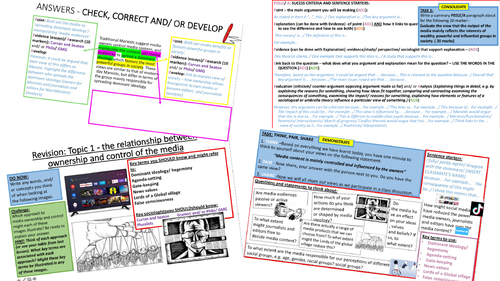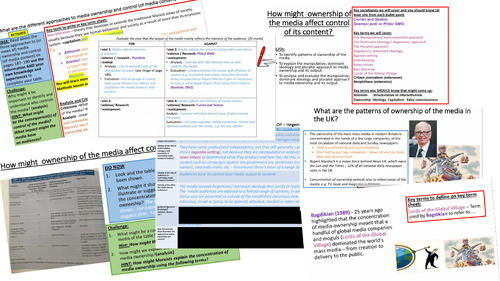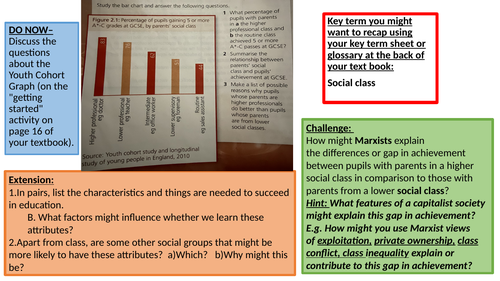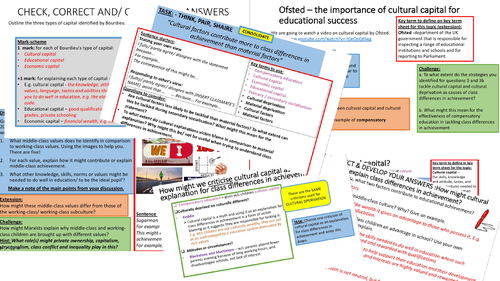
154Uploads
20k+Views
4k+Downloads
All resources

AQA A-level Sociology: Media Topic 1 Ownership and control Revision lesson
Detailed and diiferentiated (up and down), student led lesson that recaps:
patterns of ownership
the mainpulative, hegemonic and plurlaist approach to media ownerhsip and control
formal and informal controls of media output or content.
References the following concepts: Agenda-setting Gate-keeping News values Marxism Structuralism vs Interactionism
Ownership Ideology Capitalism False consciousness Neo-Marxism
Lords of the Global Village Formal and informal methods of control.
ANSWERS INCLUDED FOR SOME MAIN ACTIVITIES INCLUDED**
RESOURCES FOR LESSON CAN BE FOUND AT THE END OF PTT
Made for AQA A-level but can be easily used for other specs (just need a different source of information/ textbook)
**Based on the content in 'SOCIOLOGY For AQA Volume 2 by Browne, Blundell & Law **

AQA A-level Sociology: Media Topic 1 - Ownership and control of output
Detailed and differentiated (up and down), student led lesson that allows students to examine patterns of media ownership and the three main approaches (manipulative, hegemonic and pluralist) to media ownership and control of media output. Also introduces studets to the difference between Marxism and Neo-Marxism and links to structural vs humanistic marxism and structural determinsm. Examines the following concepts to do this: Ideology, Hegemony, Agenda-setting, Gate-keeping, News values, Marxism Neo-Marxism, Lords of the Global Village.
ANSWERS TO MAIN ACTIVITIES INCLUDED**
RESOURCES FOR LESSON CAN BE FOUND AT THE END OF PTT
Made for AQA A-level but can be easily used for other specs (just need a different source of information/ textbook)
**REQUIRES textbook - 'SOCIOLOGY For AQA Volume 2 by Browne, Blundell & Law **

Sociology Education Class differences in achievement (internal factors) - Class identities
Detailed and differentiated (up and down), student led lesson that explores pupil identity, class identities, habitus, symbolic capital, symbolic violence, nike identities, style performances to enable students to understand the role of class identities in causing class differences in achievement/ working-class underachievement/ middle-class achievement. Also covers and supports students in answering 4/6 markers using a success criteria and student-friendly mark-schemes.
ANSWERS TO MAIN ACTIVITIES AND EXAM QUESTIONS ARE INCLUDED
COMES WITH FREE A-LEVEL HELP SHEET AND KEY TERM SHEET FOR TOPIC 1 & 2
**Made for AQA A-level but can be easily used for other specs (just need a different source of information/ textbook) differentiated down for GCSE) lesson **
Uses and refers to ’ AQA A Level Sociology Book One Including AS Level: Book one 3rd Revised edition by Rob Webb, Hal Westergaard, Keith Trobe, Annie Townend ’ textbook

Sociology Education Class differences in achievement - Assessment & Feedback lesson
Asessment questions for A-level Sociology (4, 6, 10, 30 markers) AND detailed and differentiated (up and down), student led feedback DIRT lesson that explores recaps how to answer4, 6, 10 & 30 markers and provides answers for assessment. Includes student friendly success criteria AND mark-schemes.
ANSWERS TO MAIN ACTIVITIES AND EXAM QUESTIONS ARE INCLUDED
**Made for AQA A-level but can be easily be changed and used for AS Level and other specs, or differentiated down for GCSE) lesson **

AQA A-level Sociology: Education Class - Material deprivation
Detailed and diiferentiated (up and down), student led lesson that explores class differences in achievement the role of material deprivation in causing or contributing to it. Introduces students to material vs cultural factors and external vs internal factors. Also introduces students to how to answer 4 and 6 markers using a success criteria and student-friendly mark-schemes.
ANSWERS TO MAIN ACTIVITIES AND EXAM QUESTIONS ARE INCLUDED
**Made for AQA A-level but can be easily used for other specs (just need a different source of information/ textbook) differentiated down for GCSE) lesson **
Uses and refers to ’ AQA A Level Sociology Book One Including AS Level: Book one 3rd Revised edition by Rob Webb, Hal Westergaard, Keith Trobe, Annie Townend ’ textbook

Sociology Education Class differences in achievement - Cultural capital
Detailed and differentiated (up and down), student led lesson that explores cultural, educational and economic capital and compensatory education to enable students to understand the role of cultural capital in causing class differences in achievement/ middle-class achievement. Also covers and supports students in answering 4/6 markers using a success criteria and student-friendly mark-schemes.
ANSWERS TO MAIN ACTIVITIES AND EXAM QUESTIONS ARE INCLUDED
COMES WITH FREE A-LEVEL HELP SHEET AND KEY TERM SHEET FOR TOPIC 1 & 2
**Made for AQA A-level but can be easily used for other specs (just need a different source of information/ textbook) differentiated down for GCSE) lesson **
Uses and refers to ’ AQA A Level Sociology Book One Including AS Level: Book one 3rd Revised edition by Rob Webb, Hal Westergaard, Keith Trobe, Annie Townend ’ textbook

AQA GCSE Sociology: Family- Marxist functions of the family (Zaretsky)
Detailed lesson with lots of scaffolding based on adaptive teaching that help students understand marxist functions of the family (Zaretsky)
Includes key term sheet with definitions for the lesson (new key terms but also key terms that students should have been taught previously that link to this lesson)
Includes 4 marker ‘perspective’ exam question and provides scaffolding to help students answer it and includes student friendly mark-scheme for peer or self assessment.
ANSWERS TO MAIN ACTIVITIES INCLUDED
Covers the following key terms: Unit of consumption, The Marxist Warm Bath Theory, Socialism
Covers the following key sociologists: Zaretsky
Covers the following key terms that should already be known: Family form – Convention nuclear family – Bourgeoisie - Proletariat – Unit of consumption – Economic function – Stabilisation of adult personalities (The Warm Bath theory) - The traditional domestic division of labour - The contemporary domestic division of labour -Capitalism - Marxism - Profit - Social class - Ownership – Exploit - Inequality - Capitalism - Means of production - Structuralism vs Interactionism - Conflict vs Consensus theory - Agency of socialisation - Agents of socialisations – Systems – Processes - Agency of social control - Agents of social control - Culture - Norms - Values Social processes - Social structures - Positive sanctions Negative sanctions - Socialisation - Primary socialisation - Secondary socialisation
Makes references to key terms students should know – Promotes a spiral curriculum by making links to key terms that students might have previously been taught that link to this lesson.
RESOURCES CAN BE FOUND AT THE END OF PPT

AQA GCSE Sociology - Research Methods: Questionnaires
Detailed lesson with lots of scaffolding based on adaptive teaching that help students understand how to use questionnaires when investigating sociological issues (e.g. the main features of questions and describe when its appropriate to use, the strengths and weaknesses of questionnaires based on their main features and how to apply our knowledge of the strengths and weaknesses of questionnaires to different sociological research topic.
Examines questionnaires in general and postal questionnaires.
Makes links to practical ethical and theoretical issues.
Covers the following key terms: Questionnaires, Postal questionnaires
Key terms you should know that link:
Quantitative data vs Qualitative data – Reliable vs Valid – Practical issues – Ethical issues – Theoretical issues – Positivism vs Interpretivist – Sample size – Representative sample – Generalise findings - Social surveys – Questionnaire - Pre-determined - Closed questions - Open questions - Postal questionnaires - Online questionnaire
INCLUDES ANSWERS FOR ACTIVITIES
Includes model answer, student friendly mark-scheme and example answers ranging from 1-4/ 4 for a research method 4 marker
RESOURCES CAN BE FOUND AT THE END OF PPT

AQA GCSE Sociology - Education: Alternative forms of education
Detailed lesson with lots of scaffolding based on adaptive teaching that help students understand alternative forms of traditional education (e.g. describe the alternative forms of educational provision, explain how the different forms of educational provision differ to traditional forms of education, analyse and evaluate the alternative forms of educational provision.
Covers the following key terms: Home education/ home-schooling, Democratic education/ de-schooling, Vocational education and training
Key sociologists mentioned that students should already be aware of: Illich (extension)
Answers to all main activities included
Resources can be found at the end of the PPT

AQA GCSE Sociology - family: Functionalist function of the family (Murdock)
Detailed lesson with lots of scaffolding based on adaptive teaching that help students criticise Murdock’s four functions of the family and analyse them by considering how they might benefit individuals and society as a whole.
Cover the following key terms:
Sexual function
Reproductive function
Education function
Economic function
Covers the following sociologists:
Murdock
ANSWERS TO SOME/ MOST/ ALL MAIN ACTIVITIES INCLUDED
*Key terms students should know:
Symmetrical family, Dual burden, Dual career families, Triple shift, Emotion work, Child-rearing,Primary socialisation, Segregated conjugal roles, joint conjugal roles, Expressive role, instrumental role, Breadwinner, Functionalism, Organic analogy
RESOURCES CAN BE FOUND AT THE END OF PPT
Includes 'teaching to all activity
ANSWERS FOR ACTIVITIES INCLUDED
Plenary helps students develop their ability to read and interpret exam items.
Includes a key term and definition sheet for the lesson (new key terms but also makes links to key terms students should have previously learnt)
Includes key term and definition sheet for the lesson

AQA GCSE Sociology - Education- Class differences in achievement- cultural deprivation
Detailed lesson with lots of scaffolding based on adaptive teaching that help students understand
Cover the following key terms:
Material factors
Cultural factors
Cultural deprivation
Speech code
The elaborate code
The restricted code
Subculture
Immediate gratification
Deferred gratification
Collectivism
Individualism
Fatalism
Present-time orientation
Future orientated
Key terms you should already know that link:
Class differences in achievement
Educational achievement
External achievement
External factors
Internal Factors
ANSWERS TO ALL MAIN ACTIVITIES INCLUDED
RESOURCES CAN BE FOUND AT THE END OF PPT
Teaching to all technique included

AQA GCSE Sociology: Families - Functionalist functions of the family (Parsons
Detailed lesson with lots of scaffolding based on adaptive teaching that help students understand how might the family function to benefit individuals and society.
Cover the following key terms: Stabilisation of adult personalities (The Warm Bath Theory), The Warm Bath Theory analogy , Idealisation
Cover the following key sociologists: Parsons
Plenary includes an Item B 4 marker with detail scaffolding to help students answer it
Includes key term sheet for the lesson with key terms and definitions (and makes links to key terms students should or might know that link)
No starter activity
ANSWERS TO SOME ACTIVITIES INCLUDED
RESOURCES CAN BE FOUND AT THE END OF PPT

AQA GCSE Sociology: Family-Changes in the family over time
Detailed lesson with lots of scaffolding based on adaptive teaching that help students understand changes in the family over time.
-Includes a ‘teaching to all’ activity
-ANSWERS TO MOST ACTIVITIES INCLUDED
-Includes a item 4 marker on Young and Wilmott’s study with lots of scaffolding to help students answer it.
Covers the following key terms: Pre-industrial society, Industrial society, Unit of production, Asymmetrical family, The Principle of Stratified diffusion, Home-centered, Work-centered, Child-centered.
Covers the following key terms that you should already know: Pre-industrial society, Industrial society,
Contemporary society, Agriculture, Industries, Industrial revolution, Unit of production, Unit of consumption, Extended family, Social mobility, Ascribed status, Means of production, Geographic mobility, Symmetrical family, Commercialisation of housework.
Covers the following sociologists:Young & Wilmott.
ANSWERS TO MOST MAIN ACTIVITIES INCLUDED
Makes references to key terms students should know – Promotes a spiral curriculum by making links to key terms that students might have previously been taught that link to this lesson.

AQA GCSE Sociology Education - Education policy before 1988
Detailed lesson with lots of scaffolding based on adaptive teaching that help students understand Education reforms before 1988 (e.g. The main educational policies before 1988, the impact of educational policies before 1988, how to apply sociological perspectives to educational policies and evaluate them).
Cover the following key terms:
Education policy
Education reform
The tripartite system
Secondary modern
Comprehensive system
Secondary moderns
State-run schools
Eleven- plus exam
Compulsory [state] education
Selective schools
ANSWERS TO ALL MAIN ACTIVITIES INCLUDED .
Key terms students should know:
Grammar vs comprehensive schools , Academies/ free schools,
State-run education/ schools, Working-class subculture, Culture Norms, values, setting Mixed-ability classes, Banding Local Education Authority (LEA), Independent/ private schools
RESOURCES CAN BE FOUND AT THE END OF PPT

AQA GCSE Sociology - Research Methods: How do sociologists begin their research?
Detailed lesson with lots of scaffolding based on adaptive teaching that help students understand how sociologists begin their research (e.g. what is meant by research design, hypothesis, research questions, aims , pilot study, the first two stages of research process and assessing its usefulness.
Covers the following key terms: Research design, Hypothesis, Research questions, Research aims and Pilot study
Makes links to key terms that students should have already covered the following key terms: Respondent, Response rate, Participants, Sociological research, Research process and Data
Answers to all activities included
resources can be found at the end of the PPT

AQA A-level Sociology: Education Topic 3 Ethnic differences - Institutional racism
Detailed and differentiated (up and down) student led lesson that explores the following so students are able to understand institutional racism and explain how it might cause ethnic differences in achievement: Institutional racism, Marketisation (extension), The New IQism, Ethnocentric, Ethnocentric curriculum, Model minorities, The foundation stage profile (FSP), Aim Higher initiatives/ programmes
Covers the ideas of Troyna and Williams Gillborn, David, Ball, Sewell (as a criticism)
Covers criticisms of Gillborn’s arguments
Includes answers for MOST activities - NOTE - NO ANSWERS FOR ‘DO NOW’ but can be done on the board with students.
Makes some links to the following key terms students should know:
Internal vs External factors, Cultural vs Material factors, Social processes, Labelling, Streaming, Self-fulfilling prophecy
NOTES:
-Uses and refers to ’ AQA A Level Sociology Book One Including AS Level: Book one 3rd Revised edition by Rob Webb, Hal Westergaard, Keith Trobe, Annie Townend ’ textbook
-RESOURCES CAN BE FOUND AT THE END OF THE PPT.

GCSE Sociology – Introduction to Marxism
explores capitalism, profit, social class, ownership, interests, structuralism, conflict theories, exploitation, false consciousness and social relations of production as a way to introduce students to the main Marxist views and ideas.
Includes answers for main activities
Resources can be found at the end of the PPT.
Made to meet the AQA spec but can be used (and edited if needed) for other exam boards

GCSE Sociology – Introduction to Feminism
explores sex, gender, gender roles, patriarchy, gender inequality as a way to introduce students to the main feminist views of society and ideas.
Includes answers for main activities
3 marker with a success criteria and student friendly mark-scheme
Resources can be found at the end of the PPT (worksheet is in folder).**
Made to meet the AQA spec but can be used (and edited if needed) for other exam boards

GCSE Sociology – Introduction to functionalism
Explores value consensus, social order, biological/ organic analogy, structuralism, consensus theories and social cohesion as way of introducing students to the key main functionalist views and ideas.
3 marker with a success criteria and student friendly mark-scheme
Includes answers for main activities
Resources can be found at the end of the PPT.
Made to meet the AQA spec but can be used (and edited if needed) for other specs

AQA A-level Sociology: Education - Class differences in achievement (Cultural deprivation)
Detailed and differentiated (up and down), student led lesson that explores collectivism vs individualism, elaborate vs restricted code, subculture, fatalism vs meritocracy, deferred vs immediate gratification, meritocracy, present-time vs future orientated vs compensatory education to enable students to understand the role of cultural deprivation in causing class differences in achievement/ working-class underachievement. Also covers and supports students in answering 4/6 markers using a success criteria and student-friendly mark-schemes.
**Cover the following key terms:
Compensatory education
Meritocracy
Cultural deprivation
The elaborate code
The restricted code
Subculture
Immediate gratification
Deferred gratification
Collectivism
Individualism
Fatalism
Present-time orientation
Future orientated
**Key terms you SHOULD already know that we will cover:
•Class differences in achievement
•Internal factors
•External factors
•Material factors
•Cultural factors
•Norms
•Culture
•Values
•Socialisation
•Agents of socialisation
**Key sociologists we will cover (at least one from each bullet point):
1.Bernstein
2.Douglas/ Feinstein/ Bernstein and Young
3.Sugarman
4.Keddie (extension)
5.Troyna and Williams (extension)
6.Blackstone and Mortimore(extension)
ANSWERS TO MAIN ACTIVITIES AND EXAM QUESTIONS ARE INCLUDED
**TEACHING to all activities included
COMES WITH FREE A-LEVEL HELP SHEET AND KEY TERM SHEET FOR TOPIC 1 & 2
**Made for AQA A-level but can be easily used for other specs (just need a different source of information/ textbook) differentiated down for GCSE) lesson **
Uses and refers to ’ AQA A Level Sociology Book One Including AS Level: Book one 3rd Revised edition by Rob Webb, Hal Westergaard, Keith Trobe, Annie Townend ’ textbook




















